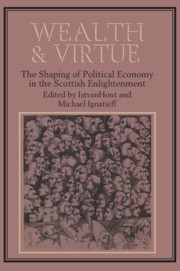Book contents
- Frontmatter
- Contents
- Preface
- List of abbreviations
- 1 Needs and justice in the Wealth of Nations: an introductory essay
- 2 Where had the Scottish economy got to by the third quarter of the eighteenth century?
- 3 Gershom Carmichael and the natural jurisprudence tradition in eighteenth-century Scotland
- 4 The Scottish professoriate and the polite academy, 1720–46
- 5 From applied theology to social analysis: the break between John Locke and the Scottish Enlightenment
- 6 The Scottish Enlightenment at the limits of the civic tradition
- 7 Adam Smith as civic moralist
- 8 The legal needs of a commercial society: the jurisprudence of Lord Kames
- 9 Cambridge paradigms and Scotch philosophers: a study of the relations between the civic humanist and the civil jurisprudential interpretation of eighteenth-century social thought
- 10 Adam Smith's ‘enduring particular result’: a political and cosmopolitan perspective
- 11 The ‘rich country–poor country’ debate in Scottish classical political economy
- 12 John Millar and individualism
- 13 Scottish echoes in eighteenth-century Italy
- Index
13 - Scottish echoes in eighteenth-century Italy
Published online by Cambridge University Press: 05 June 2012
- Frontmatter
- Contents
- Preface
- List of abbreviations
- 1 Needs and justice in the Wealth of Nations: an introductory essay
- 2 Where had the Scottish economy got to by the third quarter of the eighteenth century?
- 3 Gershom Carmichael and the natural jurisprudence tradition in eighteenth-century Scotland
- 4 The Scottish professoriate and the polite academy, 1720–46
- 5 From applied theology to social analysis: the break between John Locke and the Scottish Enlightenment
- 6 The Scottish Enlightenment at the limits of the civic tradition
- 7 Adam Smith as civic moralist
- 8 The legal needs of a commercial society: the jurisprudence of Lord Kames
- 9 Cambridge paradigms and Scotch philosophers: a study of the relations between the civic humanist and the civil jurisprudential interpretation of eighteenth-century social thought
- 10 Adam Smith's ‘enduring particular result’: a political and cosmopolitan perspective
- 11 The ‘rich country–poor country’ debate in Scottish classical political economy
- 12 John Millar and individualism
- 13 Scottish echoes in eighteenth-century Italy
- Index
Summary
In his Historical Memoirs of the Life of Suard, published in Paris in 1820, Dominique-Joseph Garat referred to the arguments aroused in Paris in the 1760s by the publication of Cesare Beccaria's Of Crimes and Punishments. He recalled how Suard – one of the most active intermediaries between the Paris of the Encyclopedists and the other European centres of the Enlightenment – dwelt particularly on the impact of the final part of the Milanese philosopher's famous treatise, chapter 41 of the French translation by Morellet. ‘This chapter, which Suard re-read in the last days of his life, seemed to possess the prescience of an oracle and Suard, an admirer of the Scottish philosophical school, almost preferred it to Ferguson's History of Civil Society, a work remarkable for its merit and utility.’ Beccaria's chapter was a dense and compact sketch of the history of human society from the age of ‘primitive peoples’ to the ‘formation of large societies’, from the age of faith to the dawn of reason. So tragic and arduous had this passage been that there was good reason to regret all that man had had to abandon in order to make it possible. Particularly ‘difficult and terrible’ had been the passage from the age of error to the age of reason: ‘entire generations' had been sacrificed for the sake of the happiness of those destined to make the sorrowful but necessary transition from the darkness of ignorance to the light of philosophy, from the age of tyranny to the dawn of liberty.’
- Type
- Chapter
- Information
- Wealth and VirtueThe Shaping of Political Economy in the Scottish Enlightenment, pp. 345 - 362Publisher: Cambridge University PressPrint publication year: 1983
- 9
- Cited by

